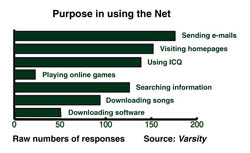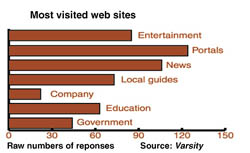 Online
Edition
Online
Edition | From
the editor Letters to the editor Milestone Answerman Campus Life Periscope Social Issues People Photo Features Education Channel Culture & Leisure Science |
| Last
Issue Archive |
| About
Varsity Advertise Media Links CUHK homepage JLM homepage |
Also
in Periscope
Dot-coms
make new move
Related Links
Pricewaterhouse-
-Coopers
![]()
Looking
ahead to big $$$
Dot-coms’
survival tactics
By Eva Ling, Arith Leung & James Chen
|
|
Dot-coms soared. Dot-coms crashed. Dot-coms have come and gone. People label
dot-coms as “money-burning” businesses.
However, not all Internet companies are suffering losses.
Hongkong.com is one of the few that manage to make money out of this business.
Hongkong.com doubled its net income to $4.5 million in the third quarter of
2000.
Based on audit guidelines endorsed by PricewaterhouseCoopers, an international
consultancy firm, Hongkong.com was getting 5.6 million daily pageviews by
September 2000.
It also had 1.35 million registered subscribers at that time.
Mr. Rudy Chan is the chief executive officer of Hongkong.com Corp.
According to Mr. Chan, the goal of the company is to satisfy users’ needs and
to build loyalty among users.
Hongkong.com was rated as the most “attached” site in Nielsen/Net
Ratings’ inaugural poll conducted in November 2000.
E-match is a feature of Hongkong.com. It is a highly interactive online
love-matching platform.
“We also help different companies and businesses to find their dream matches
or partners by using the e-match platform,” Mr. Chan said.
“They just need to state their criteria and preferences for their partners in
the business.”
Creative advertising and promotional strategies are keys to Hongkong.com’s
success.
However, successful examples like Hongkong.com are still rare.
In fact, many well-known dot-coms in Hong Kong, like Sina.com and Hkcyber.com,
are still running at a loss.
Miss Cindy Lee is the public relations manager of Sina.com.
“As of now, our company has about US$12.6 million in hand globally,” Miss
Lee said.
“We are still running at a loss despite a 296 percent increase in our net
revenue last year.”
According to Sina.com’s financial advisers, their capital can subsist for
about 4 years.
Miss Lee thinks there are several reasons that dot-coms lose money.
First, some dot.coms hire too many editorial staffers to provide contents.
Professional editorial teams are costly and thus a heavy burden.
Second, some dot-coms spend too much money on promotional campaigns, money that
cannot be recovered in a short time. This is a fatal blow.
Third, some Internet companies take over weaker firms and made bad investment
decisions.
Miss Lee admitted that Sina.com has encountered the above difficulties.
|
Top
10 most popular web sites in SAR 1.
www.yahoo.com |
|
Methodology
of Varsity’s survey Varsity’s survey is based on a random sampling of university students in Hong Kong. It aims at finding out their behaviours while using the Internet. From
23 to 28 November 2000, 245 questionnaires were distributed to
students on campuses at the seven universities in the SAR, namely,
The Chinese University of Hong Kong, the University of Hong Kong,
City University of Hong Kong, Hong Kong Baptist University, Hong
Kong Polytechnic University, and Lingnan University. Two hundred
questionnaires were returned. Interviewees
were asked to list the three most visited web sites. They were also
asked about their use of the Internet. For
the full sample, the sampling error is 6.9 percent, using a 95
percent confidence level. The error margin is greater for
percentages based on less than the full sample.
|
Nonetheless, they managed to solve them.
To solve the problem of a costly editorial team, Sina.com bought contents from
sites like Cashonline.com, thus greatly reducing costs.
To promote its site, Sina.com has created “Sinaman”, a cartoon character,
instead of hiring celebrities, thus reducing promotional costs.
At the beginning, Sina.com bartered with some media companies like Metro
Broadcast to promote its web site.
Such cooperation in the form of barters, instead of paying advertising fees,
again saved them money.
Hkcyber.com was founded by media critic Mr. Wong Yuk Man.
It had suffered a $16 million loss by the third quarter of 2000, although it
carried out numerous remedial plans.
Nevertheless, Mr. Wong is confident and optimistic about his business.
Said he: “We could probably break even by the end of 2001.”
Hkcyber.com had approximately 300,000 users at the end of 2000.
But to him, the pageviews of Hkcyber.com are no longer his target.
“Our web site has already gained popularity in Hong Kong,” he said. “Now,
we are concerned about users’ actions.
“Internet companies should have a global perspective. Hong Kong itself is
only a small market.”
Hkcyber.com plans to cooperate with Internet service providers in Canada to
meet the needs of ethnic Chinese people in North America.
But the first thing they need to do is to set up servers in Canada in order to
ensure that the web site can be viewed with good quality from abroad.
Unlike Internet companies that acquire and combine with traditional media, Mr.
Wong said Hkcyber.com would not go back to the old economy.
Instead, Hkcyber.com will become an interactive and three-dimensional medium.
Although some dot-coms have closed down recently, Miss Lee of Sina.com is still
optimistic because the Internet will continue to be trendy in the future.
Sina.com’s target is to break even by the years of 2002-2003.
“For advertising, we are now turning our eyes to the mainland market,” said
Miss Lee.
Some big companies on the mainland like Kodak have become Sina.com’s
advertisers.
To generate revenue, Sina.com is planning to charge customers a small fee to
keep them away from advertisements.
Said Miss Lee: “It may sound strange that users need to pay for not receiving
any advertisements.
“However, many people think the advertisements are too annoying. They are
willing to pay for deleting them.”
She pointed out that by doing so, users on the one hand would not be bothered
by the advertisements. On the other hand, advertisers would reduce wastage in
their advertising strategies.
Apart from these, Sina.com is planning to charge users a small fee for cleaning
up computer viruses for them.
It plans to provide free virus checking service for members. If their
customers’ computers are attacked by viruses, the company will provide
anti-virus software and charge them accordingly.
Said Miss Lee: “Since Sina.com is a global company, we hire workers in
different countries according to their wage rates.
“We hired some frontline workers in China where the labour cost is low.”
Apart from breaking even in 2002, Sina.com also aims at being the No. 1 Chinese
Internet content provider.
Some dot-coms charge for information in order to earn more.
Mr. Chan of Hongkong.com does not think it is the right time for initiating
this practice.
He said: “Every piece of information, product or service has its market
price. In a free market like Hong Kong’s, the market price is zero.”
He said that billing for information has not gained market acceptance yet, but
he is open to the idea.
Unless the information provided is very unique, the public will not pay for it.
He
said, “If we are confident that the information bears a high market
price and market acceptance of billing information is likely to develop,
we may take this lead.”![]()

Many
dot-coms are struggling just to break even. Which ones will survive is
anybody’s guess.


